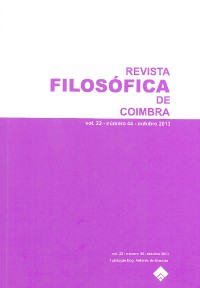Please use this identifier to cite or link to this item:
https://hdl.handle.net/10316.2/34107| DC Field | Value | Language |
|---|---|---|
| dc.contributor.author | Lima, Paulo Alexandre | - |
| dc.date.accessioned | 2014-10-20T15:37:12Z | |
| dc.date.accessioned | 2020-09-24T17:45:26Z | - |
| dc.date.available | 2014-10-20T15:37:12Z | |
| dc.date.available | 2020-09-24T17:45:26Z | - |
| dc.date.issued | 2013 | - |
| dc.identifier.issn | 0872-0851 | - |
| dc.identifier.uri | https://hdl.handle.net/10316.2/34107 | - |
| dc.description.abstract | O mais das vezes, tende‑se a considerar o fenómeno da solidão apenas como um dos temas possíveis da filosofia. No presente estudo, ao invés, pretende‑se apresentar a solidão como o fenómeno fundamental da filosofia: aquele de que a filosofia nasce e com que mais propriamente se ocupa, ao ocupar‑se consigo mesma. Ao escolhermos Heidegger como guia, duas das estações incontornáveis do itinerário a seguir são a análise do fenómeno da saudade e a análise do fenómeno do tédio profundo. A tese de Heidegger é a de que a solidão, enquanto condição da filosofia e da existência humana em geral, se exprime por via daquilo a que costumamos chamar saudade e que Heidegger procura conceber a partir do que designa como tédio profundo. Neste sentido, o nosso propósito fundamental é o de perceber como é que Heidegger entende: 1) a relação entre a saudade e o tédio profundo, 2) a relação entre estes dois fenómenos e o da solidão e 3) a relação entre a solidão, a filosofia e a existência humana. | por |
| dc.description.abstract | Most of the time one tends to consider the phenomenon of solitude as simply one of the possible themes in philosophical research. In this study, however, we intend to present solitude as a most fundamental theme in philosophical research—one with which philosophical research occupies itself in order to grasp the very meaning of its own activity. Because we chose Heidegger as guide, two of the fundamental stages of our itinerary are the analysis of nostalgia and that of profound boredom. Heidegger’s thesis is that solitude (conceived as the very nature of philosophy and of human existence in general) expresses itself through nostalgia— a phenomenon that Heidegger connects with profound boredom. The fundamental purpose of our study, therefore, is to explain how Heidegger understands: 1) the relationship between nostalgia and profound boredom, 2) the relationship between these phenomena and the phenomenon of solitude and 3) the relationship between solitude, philosophy and human existence. | eng |
| dc.language.iso | por | - |
| dc.publisher | Faculdade de Letras da Universidade de Coimbra, Instituto de Estudos Filosóficos | - |
| dc.subject | Heidegger | eng |
| dc.subject | Solitude | eng |
| dc.subject | Philosophy | eng |
| dc.subject | Nostalgia | eng |
| dc.subject | Boredom | eng |
| dc.subject | Existence | eng |
| dc.subject | Heidegger | por |
| dc.subject | Solidão | por |
| dc.subject | Filosofia | por |
| dc.subject | Saudade | por |
| dc.subject | Tédio | por |
| dc.subject | Existência | por |
| dc.title | Heidegger e a solidão da filosofia | por |
| dc.type | article | - |
| uc.publication.collection | Revista Filosófica de Coimbra vol. 22, nº 44 | - |
| uc.publication.firstPage | 433 | - |
| uc.publication.issue | 44 | - |
| uc.publication.lastPage | 472 | - |
| uc.publication.location | Coimbra | - |
| uc.publication.journalTitle | Revista Filosófica de Coimbra | - |
| uc.publication.volume | 22 | por |
| dc.identifier.doi | 10.14195/0872-0851_44_9 | - |
| uc.publication.section | Artigos | - |
| uc.publication.orderno | 10 | - |
| uc.publication.area | Artes e Humanidades | - |
| uc.publication.manifest | https://dl.uc.pt/json/iiif/10316.2/34107/242934/manifest?manifest=/json/iiif/10316.2/34107/242934/manifest | - |
| uc.publication.thumbnail | https://dl.uc.pt/retrieve/11672549 | - |
| item.grantfulltext | open | - |
| item.fulltext | With Fulltext | - |
| Appears in Collections: | Revista Filosófica de Coimbra | |
Files in This Item:
| File | Description | Size | Format | |
|---|---|---|---|---|
| rfc44_artigo10.pdf | 5.8 MB | Adobe PDF |  |
Items in DSpace are protected by copyright, with all rights reserved, unless otherwise indicated.
